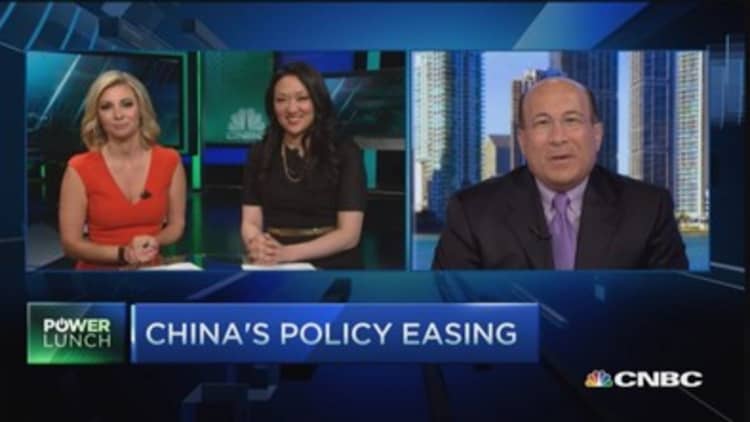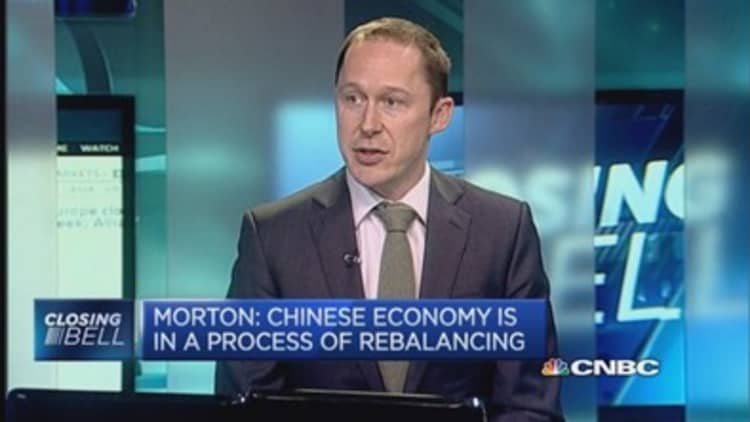Economists almost all agree that the U.S. Federal Reserve will raise interest rates this year. But while experts have a lot to say about higher rates' effect on the United States, there's been a lot less talk about what they will mean for the world's No. 2 economy.
Many newly industrialized countries—such as Brazil and Mexico—will likely suffer from a Federal Reserve rate hike, but for a variety of reasons, China is suited to ride out a tightened dollar supply with relative ease, according to economists.
New York Fed President William Dudley said in a Monday address that the hike could have "disruptive" global implications, and investors are keenly watching China, which has been a key driver of international growth. But experts told CNBC that the country will not feel any significant negative impact from a U.S. rate hike.
"An interest rate hike is not going to shake things up too much in Asia," said Frederic Neumann, chief Asia economist at HSBC. "A first hike might introduce uncertainty, but it's not going to be economically disruptive ... the Bank of Japan and the [European Central Bank] still have their feet firmly on the gas."
This is especially true for the first rate increase—whenever that may be—which is expected only to increase rates by 25 basis-points (0.25 percent), Neumann explained. And while a subsequent course of hikes could affect China—especially if the Fed moves aggressively over a short time frame—those effects would likely be marginal, he added.
Read MoreThe week ahead in Asia: What to watch for
Concerns about China are twofold: Some fear that an increase in U.S. rates could drive capital out of the Chinese ecosystem, thereby tightening conditions there at the same time that growth is already slowing. Neumann, however, said Beijing is well equipped to handle the situation.
"We think the People's Bank of China has sufficient ammunition to counteract the Fed's tightening offensive by cutting interest rates itself," he said last week, "It should be able to keep financial conditions on an even keel, even if the Fed raises interest rates."
Indeed, China's central bank its banks' reserve requirement ratio by 100 basis-points, the sharpest decrease in that country since 2008.

The other worry about China, expressed by the likes of Harvard's Jeffrey Frankel and The Economist, is that Chinese companies' high levels of dollar-denominated debt could make it hard for them to pay back loans as the greenback rises in value.
Conventional models suggest that the U.S. currency should appreciate with a Fed hike, because global investors are drawn to the better returns available through dollar deposits, and they're encouraged by the central bank's confidence about the American economy. So that expected move should make it more costly for foreign companies (who earn profits in their own, local currency) to pay off debts that are in dollars.
Read MoreWhat China's cut to reserve rules means for stocks
That argument says that Chinese firms did not learn the key lessons of the Asian financial crisis of 1997, and took out short-term dollar debt to finance their operations while U.S. rates were low. Commonly cited statistics suggest that nearly a quarter of Chinese corporate debt is tied to the greenback, while less than 10 percent of Chinese earnings are in dollars.
But experts told CNBC that this so-called "mismatch" will not have the same impact on China that it will on a country like, say, Brazil.
"In general, you would say that China would be affected, but I just think that China—in a sense, if they want to be—is almost bulletproof," said Robert Sinche, Amherst Pierpont Securities global strategist.

He said that Beijing will likely help its companies avoid the pitfalls of dollar-denominated debt by defending the Chinese yuan's loose peg to the dollar. "They're not going to let (their) currency depreciate," Sinche said. (That said, some Chinese companies may well default in coming months as a continued economic slowdown hits highly leveraged sectors such as real estate development.)
The Fed is expected to raise U.S. rates incrementally, and that measured pace may mean that dollars don't appreciate in Asia at all, according to a recent paper from fund manager Matthews Asia. In fact, historical evidence suggests that some received truths about Fed-inspired downward pressure on regional stocks, bond prices and currencies are hardly certainties, the study said.
Read MoreDon't invest in China: Professor
Chinese equities have shown massive gains recently—Shanghai stocks are up more than 30 percent year-to-date—and some have even suggested that China is trying to slow the recent upswing in its markets. Under those conditions, it is unlikely that a marginal Fed hike would significantly depress those equities, experts said.
The one caveat to experts' relatively rosy assessment for U.S. rates and China is that Hong Kong could be affected by an aggressive course of U.S. tightening. Without its own capital controls, Hong Kong could see its growth and consumer spending hit by rising interest rates in ways that the mainland can avoid, HSBC's Neumann said.


